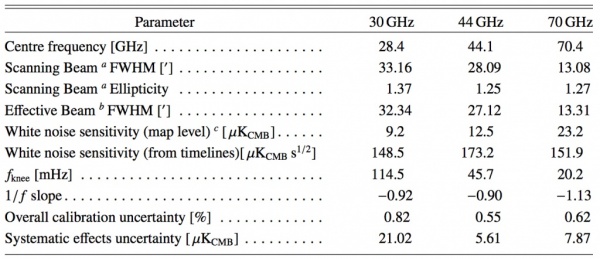Summary of LFI data characteristics
The LFI performance are summarized in Table 1 below. All the details can be found in the LFI data processing paper Planck-2013-II[1].
Table 1. Summary of the LFI performance parameters

FWHM and ellipticity from scanning beam evaluated fitting Jupiter directly in the timelines. FWHM from effective beam estimated from the main beam solid angle of the effective beam. Those are the values used in the source extraction pipeline Planck-2013-XXVIII[2]. White noise per pixel computed from half-ring difference maps. Those values are within the 1% with the white noise sensitivity computed directly on the timelines, taking in account the actual mission time minus the manoeuvres and bad-science flagged data.
References[edit]
- ↑ Planck 2013 results. II. Low Frequency Instrument data processing, Planck Collaboration, 2014, A&A, 571, A2.
- ↑ Planck 2013 results. XXVIII. The Planck Catalogue of Compact Sources, Planck Collaboration, 2014, A&A, 571, A28.
(Planck) Low Frequency Instrument
Full-Width-at-Half-Maximum